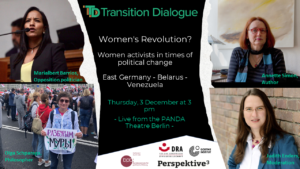The role of women in conflict and transition societies is significant for a variety of reasons. Women are active agents of change and a driving force. In December 2020, the conference “A women’s revolution” took place, where we undertook an intensive, virtual journey around the world to understand the true dimension of the role of women in societies undergoing transition – especially with regard to successes, perspectives and outlooks for the future. Specifically, the role of women in the respective transformation processes was examined, using the examples of East Germany, Belarus and Venezuela, 3 women activists in times of political change were given a chance to speak.
Our speakers at this event were:, Olga Schparaga, Philosophers and activist / Belarus, Annette Simon, Psychoanalyst and author / Germany, Marialbert Barrios, Politician of the opposition, Vice president of the commission on foreign policy / Venezuela. The event was moderated by Dr. Judith Enders, Perspektive e.V.
We also had video participation from Olena Pravylo from Congress of Cultural Activists, Louisa Slavkova from Sofia Platform Foundation, and Alicja Pacewicz from Center of Citizenship Education. You can find those videos below.
The psychoanalyst and author Annette Simon reported about women from the GDR and her own experiences regarding revolution and transition. She told of committed women’s movements that stood up for women’s rights and also participated in the Round Table talks. After the postulated equality in the GDR, there were some difficulties for women from East Germany, who were confronted with a different image of women after reunification. The rapprochement between feminist committed women in East and West Germany was not always easy.
Philosopher and activist Olga Shparaga shared her perspective on the transition processes currently on-going in Belarus and the role women play in them. In general, there was an upsurge in Belarusian society. People who previously would not have identified themselves as active citizens were now beginning to get involved. Women in particular were very important in this, especially in regards to supporting presidential candidate Sviatlana Tsikhanouskaya. Women in Belarus are currently campaigning not only for their women’s rights, but for a common social good, trying to get rid of patriarchy and the patriarch alike.
Opposition politician and Vice-President of the Standing Committee of Foreign Policy, Sovereignty and Integration at the National Assembly in Venezuela, Marialbert Barrios, spoke about the transformation process in her country and the emancipatory movement of women. Many processes of women’s participation take place in the background, and there are few images of women, only few role models to use as inspiration. The female revolution in Venezuela is therefore silent, but it is rather effective in this process of fighting for changes.
In addition to the speakers and the stimulating exchange, interesting video contributions were presented, which take a closer look at the position of women in the transition period in Ukraine, Bulgaria and Poland and provide assessments of changes.
The image of women in Ukraine is still rooted in Soviet times, women seem to be worth less than men in their role. Nevertheless, there have also been changes and women have raised their voices in several revolutions in Ukraine since the transition and found that they can be part of a change. Women are often still discriminated and absent from high positions, however the potential for change is there. The perspective from Bulgaria, on the other hand, shows that the seeming and de facto non-existent equality that socialism proclaimed was overcome. Women succeeded in gaining power and becoming active after the transformation period, while men remained in a kind of apathetic attitude. This is also a difference with Poland. Women in Poland were involved in the revolutionary movements in Poland, they organized strikes and initiatives to undermine the communist regime. The role of men was more marginal and women were better organized and less afraid. They acted more responsibly and very purposefully. Nevertheless, in 1989 men took over the positions of leadership. Women’s role and involvement in this process is often ignored. They had to come to terms with their social position and participation in political processes. Currently there are more and more women in the local governments and younger women in particular are experiencing more education.
Overall, the panel discussion and also the video contribution have shown that there are very different positions of women. It also embedded the time aspect, as it makes a difference whether we are in the midst of a revolutionary phase or already dealing with the aftermath. Despite that, what all countries have in common is that it takes certain conditions and types of awareness to give transformation processes a female face. Female groups are a focal point – they are important actors in these processes.
You can find a summary of the event here below, as well as the video participation from our remote participants.

